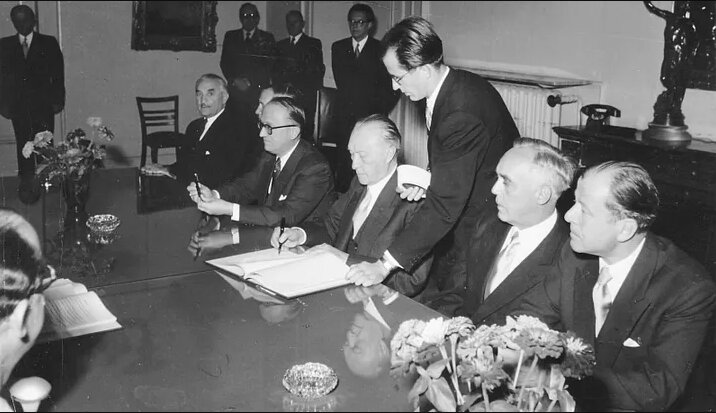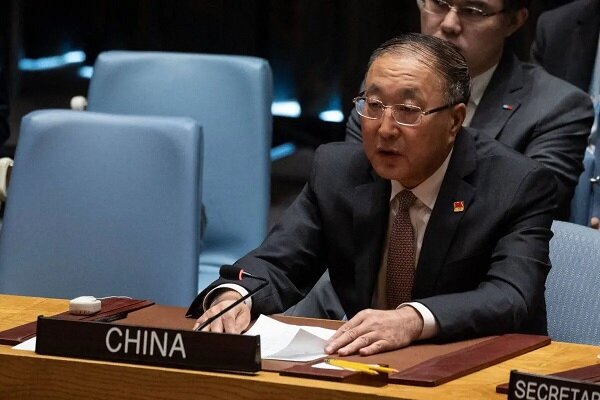Luxembourg Agreement: Debating Justice vs. Blood Money in a Controversial Settlement
Israel’s relationship with Germany stands out as one of the most intricate and historically significant diplomatic ties of the 20th century. Emerging from the aftermath of the Holocaust, this relationship has transformed from deep-seated enmity and trauma to a cautious, pragmatic engagement, culminating in pivotal agreements like the Luxembourg Agreement of 1952. This landmark agreement addressed reparations for Holocaust survivors and marked a significant turning point in the diplomatic narrative between Israel, as a newly established nation, and the Federal Republic of Germany (West Germany).
The establishment of Israel in 1948, just three years after World War II, was significantly influenced by the horrors of the Holocaust. Israel was envisioned as a sanctuary for Jews, a response to centuries of persecution that had reached their most horrific peak during the Nazi regime. In the immediate post-war period, it seemed unimaginable for any Jew, including the young leadership of the Israeli government, to reconcile or engage with Germany. The wounds were still fresh, and the pain was far too raw.
However, the urgent needs of the fledgling state and the stark realities of the geopolitical environment soon compelled Israeli leaders to consider the previously unthinkable relationship with West Germany.
The Early Years: Reluctance and Pragmatism
In the late 1940s and early 1950s, the global landscape was dominated by the Cold War. West German Chancellor Konrad Adenauer aimed to rehabilitate Germany’s image and integrate the nation into the Western bloc. Adenauer understood that addressing the crimes of the Nazi regime was essential for Germany’s moral and political rehabilitation.
Simultaneously, Israel faced the immense challenge of absorbing millions of Jewish refugees from Europe and West Asia amidst economic hardship. The young state was under significant financial pressure, allocating nearly its entire budget to infrastructure development and housing for its citizens.
Despite pressing needs, accepting reparations from Germany was deeply contentious in Israel. Many Holocaust survivors and citizens viewed any form of engagement with Germany as a betrayal of the victims. The Israeli public was sharply divided, resulting in heated debates over the moral implications of accepting what some referred to as “blood money.” Menachem Begin, head of the Herut party, was a vocal opponent, arguing that it would absolve Germans of their moral responsibility.
Nevertheless, Israeli Prime Minister David Ben-Gurion adopted a pragmatic stance. He viewed reparations not as forgiveness but as a matter of justice and restitution. Ben-Gurion contended that Germany bore a moral obligation to compensate the Jewish people for the profound suffering and losses inflicted upon them. Furthermore, financial support from Germany could prove crucial for Israel’s development and survival.
The Path to the Luxembourg Agreement
The negotiations between Israel and West Germany were fraught with tension and complexity, primarily conducted through indirect channels mediated by the Claims Conference, an organization representing Jewish Holocaust survivors. The geopolitical context of the Cold War also played a significant role in shaping these negotiations, with the United States supporting the reparations process to solidify West Germany as a bulwark against potential Soviet expansion.
In 1951, Israeli Foreign Minister Moshe Sharett formally presented the reparations claim to the four Allied powers in Germany. This claim sought compensation for the material losses suffered by Jews during the Holocaust and for the expenses incurred in resettling Holocaust survivors in occupied Palestine. Under Chancellor Adenauer’s leadership, the West German government acknowledged its responsibility and expressed willingness to negotiate.
The negotiations culminated in the signing of the Luxembourg Agreement on September 10, 1952. Under this agreement, West Germany committed to paying Israel 3 billion Deutsche Marks in goods or services over the next 12 years. Additionally, 450 million Deutsche Marks were allocated to the Claims Conference for the benefit of Holocaust survivors outside Israel.
The Significance of the Luxembourg Agreement
The Luxembourg Agreement represented a pivotal historical milestone in the relationship between Israel and Germany. It was the first formal acknowledgment of Germany’s accountability for the Holocaust and its commitment to making restitution.
For Israel, this agreement was vital, providing essential financial resources that enabled the nation to build its economy and infrastructure. The funds were instrumental in developing crucial areas such as housing, transportation, and industry, which were necessary to accommodate the influx of immigrants and establish Israel’s foundation for future growth.
However, the agreement was not without controversy. It sparked widespread public debate and even violent protests in Israel regarding the acceptance of reparations. Many Holocaust survivors and their descendants felt that no amount of money could adequately compensate for the loss of life or the trauma endured, raising challenging questions about the nature of justice and the limits of material restitution in the face of unimaginable suffering.
For Germany, the Luxembourg Agreement marked a significant step in its post-war rehabilitation. By acknowledging its historical responsibility and making reparations, West Germany sought to convey its commitment to atone for the atrocities committed against the victims of the Nazi regime.
This agreement helped reintegrate Germany into the international community, ultimately leading to its entry into NATO and the European Economic Community. The legacy of the Luxembourg Agreement initiated a gradual normalization of relations between Israel and West Germany, fostering a complex network of cooperation in areas such as trade, technology, and security over the ensuing decades. Despite this progress, the shadow of the Holocaust continued to influence the dynamics of their interactions.
In the years following the agreement, Germany has remained steadfast in its commitment to confronting its historical responsibilities. The nation has provided ongoing support for Holocaust survivors, funded educational initiatives, and worked to preserve the memory of the Holocaust. For Israel, the relationship with Germany has evolved into a strategic partnership, albeit one that remains sensitive to the historical context.






